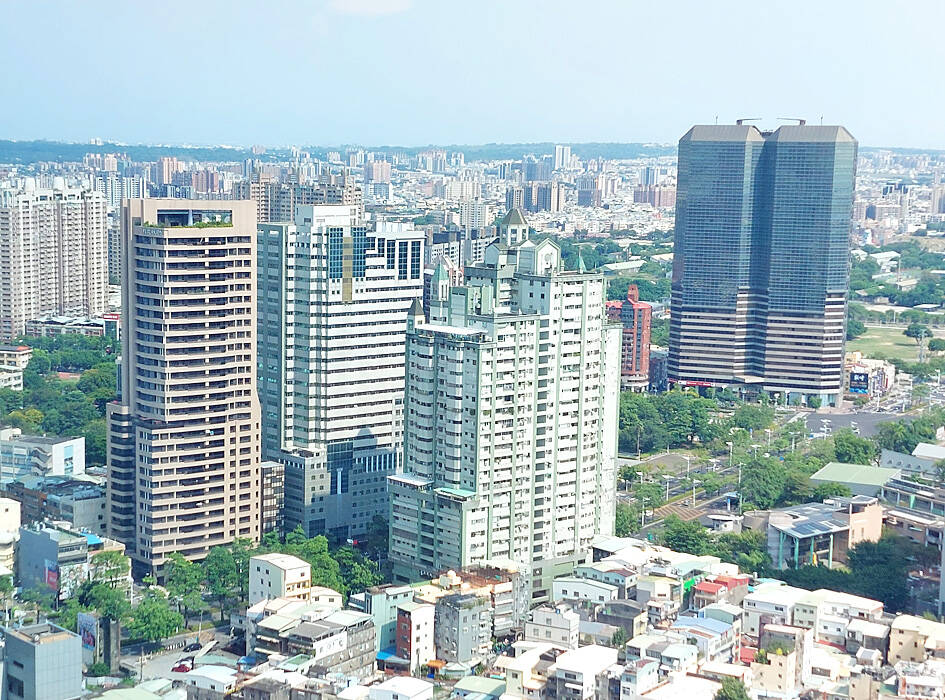Property transactions last month totaled 18,358 units in the nation’s six special municipalities, shrinking 4.2 percent from a month earlier and dashing recovery expectations as COVID-19 cases subside, the latest government agency statistics showed.
The volume translated into a 14.2 percent retreat when compared with a year earlier, the data showed.
The figures mainly reflect transactions in July and August, given time needed to process the data, Sinyi Realty Inc (信義房屋) said.

Photo: Hou Cheng-hsu, Taipei Times
Sinyi earlier predicted that transactions would perform better following the fall sales season after people became less anxious about COVID-19 and restrictions eased.
The market is not likely to improve in the near future, given that the central bank’s third interest rate hike this year of 0.125 percentage points last month is expected to have a further negative effect, Sinyi research manager Tseng Ching-der (曾敬德) said in a statement.
Transactions in Tainan reported the sharpest month-on-month decline of 12.9 percent to 1,757 units, while those in Kaoshiung dropped 5.6 percent to 2,762 units, data showed.
Property purchases in Taipei fell 12.4 percent to 1,958 units and dropped 7.8 percent to 4,120 units in New Taipei City, while Taoyuan and Taichung bucked the trend in August with advances of 5.2 percent and 1.8 percent, to 3,663 and 4,098 units, respectively, data showed.
Compared with a year earlier, only the Taichung market expanded, with a 2.2 percent gain, while other municipalities had double-digit losses ranging from 14.2 percent to 24.9 percent, data showed.
Evertrust Rehouse Co (永慶房屋) said that macroeconomic concerns are likely to dominate people’s decisions, and the chance of recovery is slim in light of interest rate hikes, inflation and geopolitical tensions.
The property market is expected to decline throughout the rest of this year after losing 1.4 percent in the first nine months, Evertrust said.

MULTIFACETED: A task force has analyzed possible scenarios and created responses to assist domestic industries in dealing with US tariffs, the economics minister said The Executive Yuan is tomorrow to announce countermeasures to US President Donald Trump’s planned reciprocal tariffs, although the details of the plan would not be made public until Monday next week, Minister of Economic Affairs J.W. Kuo (郭智輝) said yesterday. The Cabinet established an economic and trade task force in November last year to deal with US trade and tariff related issues, Kuo told reporters outside the legislature in Taipei. The task force has been analyzing and evaluating all kinds of scenarios to identify suitable responses and determine how best to assist domestic industries in managing the effects of Trump’s tariffs, he

TIGHT-LIPPED: UMC said it had no merger plans at the moment, after Nikkei Asia reported that the firm and GlobalFoundries were considering restarting merger talks United Microelectronics Corp (UMC, 聯電), the world’s No. 4 contract chipmaker, yesterday launched a new US$5 billion 12-inch chip factory in Singapore as part of its latest effort to diversify its manufacturing footprint amid growing geopolitical risks. The new factory, adjacent to UMC’s existing Singapore fab in the Pasir Res Wafer Fab Park, is scheduled to enter volume production next year, utilizing mature 22-nanometer and 28-nanometer process technologies, UMC said in a statement. The company plans to invest US$5 billion during the first phase of the new fab, which would have an installed capacity of 30,000 12-inch wafers per month, it said. The

Taiwan’s official purchasing managers’ index (PMI) last month rose 0.2 percentage points to 54.2, in a second consecutive month of expansion, thanks to front-loading demand intended to avoid potential US tariff hikes, the Chung-Hua Institution for Economic Research (CIER, 中華經濟研究院) said yesterday. While short-term demand appeared robust, uncertainties rose due to US President Donald Trump’s unpredictable trade policy, CIER president Lien Hsien-ming (連賢明) told a news conference in Taipei. Taiwan’s economy this year would be characterized by high-level fluctuations and the volatility would be wilder than most expect, Lien said Demand for electronics, particularly semiconductors, continues to benefit from US technology giants’ effort

‘SWASTICAR’: Tesla CEO Elon Musk’s close association with Donald Trump has prompted opponents to brand him a ‘Nazi’ and resulted in a dramatic drop in sales Demonstrators descended on Tesla Inc dealerships across the US, and in Europe and Canada on Saturday to protest company chief Elon Musk, who has amassed extraordinary power as a top adviser to US President Donald Trump. Waving signs with messages such as “Musk is stealing our money” and “Reclaim our country,” the protests largely took place peacefully following fiery episodes of vandalism on Tesla vehicles, dealerships and other facilities in recent weeks that US officials have denounced as terrorism. Hundreds rallied on Saturday outside the Tesla dealership in Manhattan. Some blasted Musk, the world’s richest man, while others demanded the shuttering of his